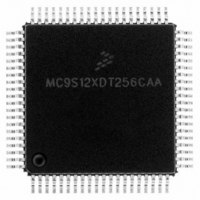MC9S12XDT256CAA Freescale Semiconductor, MC9S12XDT256CAA Datasheet - Page 409

MC9S12XDT256CAA
Manufacturer Part Number
MC9S12XDT256CAA
Description
IC MCU 256K FLASH 80-QFP
Manufacturer
Freescale Semiconductor
Series
HCS12r
Datasheet
1.MC9S12XD64CAA.pdf
(1348 pages)
Specifications of MC9S12XDT256CAA
Core Processor
HCS12X
Core Size
16-Bit
Speed
80MHz
Connectivity
CAN, EBI/EMI, I²C, IrDA, LIN, SCI, SPI
Peripherals
LVD, POR, PWM, WDT
Number Of I /o
59
Program Memory Size
256KB (256K x 8)
Program Memory Type
FLASH
Eeprom Size
4K x 8
Ram Size
16K x 8
Voltage - Supply (vcc/vdd)
2.35 V ~ 5.5 V
Data Converters
A/D 8x10b
Oscillator Type
External
Operating Temperature
-40°C ~ 85°C
Package / Case
80-QFP
Processor Series
S12XD
Core
HCS12
Data Bus Width
16 bit
Data Ram Size
16 KB
Interface Type
CAN/I2C/SCI/SPI
Maximum Clock Frequency
40 MHz
Number Of Programmable I/os
59
Number Of Timers
12
Maximum Operating Temperature
+ 85 C
Mounting Style
SMD/SMT
3rd Party Development Tools
EWHCS12
Development Tools By Supplier
EVB9S12XDP512E
Minimum Operating Temperature
- 40 C
On-chip Adc
8-ch x 10-bit
Lead Free Status / RoHS Status
Lead free / RoHS Compliant
Available stocks
Company
Part Number
Manufacturer
Quantity
Price
Company:
Part Number:
MC9S12XDT256CAA
Manufacturer:
Freescale Semiconductor
Quantity:
10 000
Company:
Part Number:
MC9S12XDT256CAAR
Manufacturer:
Freescale Semiconductor
Quantity:
10 000
- Current page: 409 of 1348
- Download datasheet (8Mb)
9.4
This section provides a complete functional description of the IICV2.
9.4.1
The IIC bus system uses a serial data line (SDA) and a serial clock line (SCL) for data transfer. All devices
connected to it must have open drain or open collector outputs. Logic AND function is exercised on both
lines with external pull-up resistors. The value of these resistors is system dependent.
Normally, a standard communication is composed of four parts: START signal, slave address transmission,
data transfer and STOP signal. They are described briefly in the following sections and illustrated in
Figure
9.4.1.1
When the bus is free, i.e. no master device is engaging the bus (both SCL and SDA lines are at logical
high), a master may initiate communication by sending a START signal.As shown in
signal is defined as a high-to-low transition of SDA while SCL is high. This signal denotes the beginning
of a new data transfer (each data transfer may contain several bytes of data) and brings all slaves out of
their idle states.
Freescale Semiconductor
9-9.
SDA
SCL
SDA
SCL
Signal
Signal
Start
Start
Functional Description
I-Bus Protocol
START Signal
MSB
MSB
AD7 AD6 AD5 AD4 AD3 AD2 AD1 R/W
AD7 AD6 AD5 AD4 AD3 AD2 AD1 R/W
1
1
2
2
Calling Address
Calling Address
3
3
4
4
5
5
Figure 9-9. IIC-Bus Transmission Signals
6
6
MC9S12XDP512 Data Sheet, Rev. 2.21
7
7
Read/
Write
Read/
Write
LSB
LSB
8
8
Ack
Ack
Bit
9
Bit
9
XX
Repeated
XXX
Signal
Start
MSB
MSB
AD7 AD6 AD5 AD4 AD3 AD2 AD1 R/W
D7
Chapter 9 Inter-Integrated Circuit (IICV2) Block Description
1
1
D6
2
2
New Calling Address
D5
3
3
Data Byte
D4
4
4
D3
5
5
D2
6
6
D1
7
7
Figure
Read/
Write
LSB
LSB
D0
8
8
Ack
No
Bit
Ack
9
No
9
Bit
9-9, a START
Signal
Stop
Signal
Stop
409
Related parts for MC9S12XDT256CAA
Image
Part Number
Description
Manufacturer
Datasheet
Request
R

Part Number:
Description:
16-BIT MICROPROCESSOR FAMILY
Manufacturer:
FREESCALE [Freescale Semiconductor, Inc]
Datasheet:
Part Number:
Description:
Manufacturer:
Freescale Semiconductor, Inc
Datasheet:
Part Number:
Description:
Manufacturer:
Freescale Semiconductor, Inc
Datasheet:
Part Number:
Description:
Manufacturer:
Freescale Semiconductor, Inc
Datasheet:
Part Number:
Description:
Manufacturer:
Freescale Semiconductor, Inc
Datasheet:
Part Number:
Description:
Manufacturer:
Freescale Semiconductor, Inc
Datasheet:
Part Number:
Description:
Manufacturer:
Freescale Semiconductor, Inc
Datasheet:
Part Number:
Description:
Manufacturer:
Freescale Semiconductor, Inc
Datasheet:
Part Number:
Description:
Manufacturer:
Freescale Semiconductor, Inc
Datasheet:
Part Number:
Description:
Manufacturer:
Freescale Semiconductor, Inc
Datasheet:
Part Number:
Description:
Manufacturer:
Freescale Semiconductor, Inc
Datasheet:
Part Number:
Description:
Manufacturer:
Freescale Semiconductor, Inc
Datasheet:
Part Number:
Description:
Manufacturer:
Freescale Semiconductor, Inc
Datasheet:
Part Number:
Description:
Manufacturer:
Freescale Semiconductor, Inc
Datasheet:
Part Number:
Description:
Manufacturer:
Freescale Semiconductor, Inc
Datasheet:











